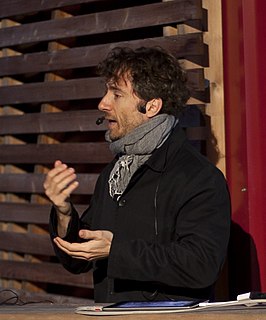A Quote by DJ Spooky
When you say what is the difference between me and my stage name the idea is that as a musician you always think of yourself as inhabiting a certain cultural space in the kind of a cultural landscape, so when I say cultural space what I mean to imply there is that you exist within certain parameters of how people think of culture.
Related Quotes
Downtown New York, I'm within certain styles of music and I'm also within certain cultural, you know, and literary context. So DJ Spooky was meant to be a kind of ironic take on that. It was always meant to be kind of a criticism and critique of how downtown culture would separate genres and styles because it was ambiguous. You couldn't fit it into anything and that was the point.
Cultural diversity and cultural change are desirable and inevitable. We are cultural animals, someone without a culture is not human. But the cultures we possess vary enormously. Indeed, the variability, over time and space is the great evolutionary advantage of humanity. Instead of changing biologically over millennia, human beings can change culturally over decades
Perhaps the most effective way to describe the approach a brand must take is to think of themselves as social cartographers. By that I mean that brands must simultaneously inspire, engage and maintain a series of conversations taking place within certain cultural landscape specific to their business goal.
And make no mistake: irony tyrannizes us. The reason why our pervasive cultural irony is at once so powerful and so unsatisfying is that an ironist is impossible to pin down. All U.S. irony is based on an implicit "I don’t really mean what I’m saying." So what does irony as a cultural norm mean to say? That it’s impossible to mean what you say? That maybe it’s too bad it’s impossible, but wake up and smell the coffee already? Most likely, I think, today’s irony ends up saying: "How totally banal of you to ask what I really mean.
I spent two years figuring out how I could turn it into something that would satisfy me as a musician but also make some kind of cross-cultural link. I feel that I kind of at least touched on the possibilities of cross-cultural music, but it is a lifetime's work, and I don't profess to be anything other than a novice at it.
Museums just seem to have this borrowed cachet—if I want to seem cultural, I will design something cultural. I resist the idea that culture is only opera houses or theatres. Culture is your entire life around you: toilets, the bus, the kerb or the dump where you drag your waste. Culture has come to mean the arts, but it’s swimming pools as well.
The idea of, say, the compressed space between the floor and the object hanging over it and then the long space between the object and the ceiling was a kind of interesting idea for me - the idea of compressing and expanding. That was an idea that I worked with, which you could only do sculpturally. You can't really do with a painting on the wall.
I think there should be some way to find some kind of reasonable accommodation that allows the state to continue to say, you know, that women's rights supersede any kind of a cultural custom that's oppressive to women, but also potentially allows a woman to take the oath, I don't know, in a separate room. It would be up to the court to find some kind of cultural accommodation.































